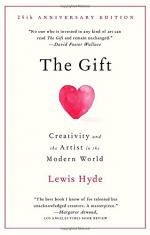|
This section contains 878 words (approx. 3 pages at 400 words per page) |

|
Summary
This chapter applies the same sort of methodology seen in the previous chapter to the life and work of one of Whitman’s contemporaries, Ezra Pound. For Hyde, the entirety of Pounds work is the playing out of a certain tension between two opposing forces and two separate powers of the will, order and fertility, and imagination and will, respectively. This tension is on display most clearly and acutely in Pound’s most famous work, his “Cantos.” In this work, according to Hyde, the fecundity and fertility of nature is contingent upon its underlying unity. This unity cannot be properly perceived without the aid of order and tradition. Hyde suggests that Pound was perhaps influenced by Confucianism in his conception of order insofar it entails both willpower and durability.
Hyde relates Pound’s notion...
(read more from the Part II, Chapter 10: “Ezra Pound and the Fate of Vegetable Money” Summary)
|
This section contains 878 words (approx. 3 pages at 400 words per page) |

|




